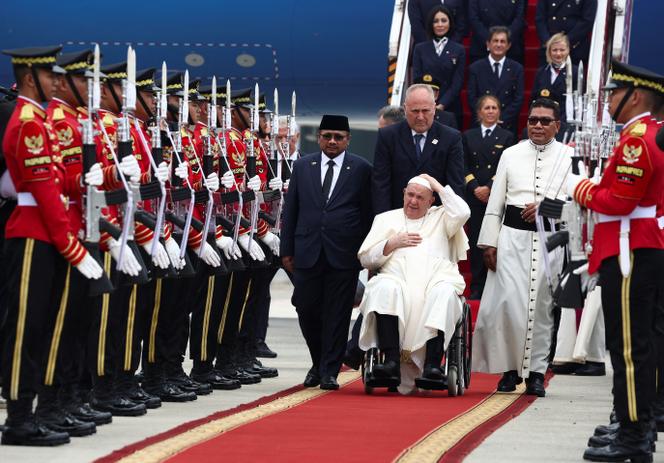


At 87, Pope Francis is almost crippled: He gets around in a wheelchair most of the time, or slowly, with the aid of a cane. His weakness in no way detracts from his ambition, as he prepares to make his longest journey, both in distance (over 30,000 kilometers) and duration, since his accession to the head of the Catholic Church in 2013. On Tuesday, September 3, the pope arrived in Indonesia, welcomed by a small ceremony at Jakarta airport, and is due to travel, until September 13, to Papua New Guinea, East Timor and Singapore. Shortly after taking off from Rome, he went to greet the 80 journalists following him one by one, as is his custom, whereas on previous trips he received them without leaving his seat.
He intends to continue spreading the word of the Church wherever Catholics live, and to promote the issues that are dear to him, such as inter-religious dialogue, the representation of the countries of the South on the international stage, social justice and the preservation of the environment. These are all major concerns for these island states. The pope sees himself as a missionary: For his 45th trip, he will follow in part in the footsteps of Saint Francis Xavier, the founder of the Jesuits, of which Jorge Mario Bergoglio was a member in Argentina before becoming Pope Francis.
"For the pope, there is the idea that the Church must be present in the peripheries, where Christianity is not sufficiently present and where the world's attention is not sufficiently focused," explained François Mabille, a specialist in religious figures at the French Institute of International and Strategic Relations. He has done this in very concrete terms by appointing cardinals in each of the countries he is about to visit. In these nations, which are marked by great ethnic, linguistic and religious diversity, the Catholic Church has to be sensitive to local cultures – one of the most delicate issues in spreading the faith. "One of the challenges for Catholicism is to be present, to win market share and, at the same time, to respect or integrate local values," said Mabille.
Accompanied by a Vatican delegation, the pope will begin his tour in Jakarta, the vibrant capital of Indonesia, the world's most populous Muslim country. Pope Francis will be able to highlight dialogue with Islam, one of the key themes of his pontificate, with an interfaith meeting on September 5 at the Istiqlal Mosque. "The Vatican really appreciates the harmony between religious communities in Indonesia and even wants to learn a lot about Islam in Indonesia," Cardinal Ignatius Suharyo Hardjoatmodjo, archbishop of Jakarta, told local journalists on August 29. In 1961, the founder of the republic of Indonesia, Sukarno, chose to build the religious edifice directly opposite the Church of Our Lady of the Assumption, as a symbol of the happy coexistence of religions. Building on this symbolism, the current president, Joko Widodo, plans to inaugurate a "fraternity tunnel" between the two places of worship, separated by a freeway, in the presence of the pope.
You have 58.95% of this article left to read. The rest is for subscribers only.
